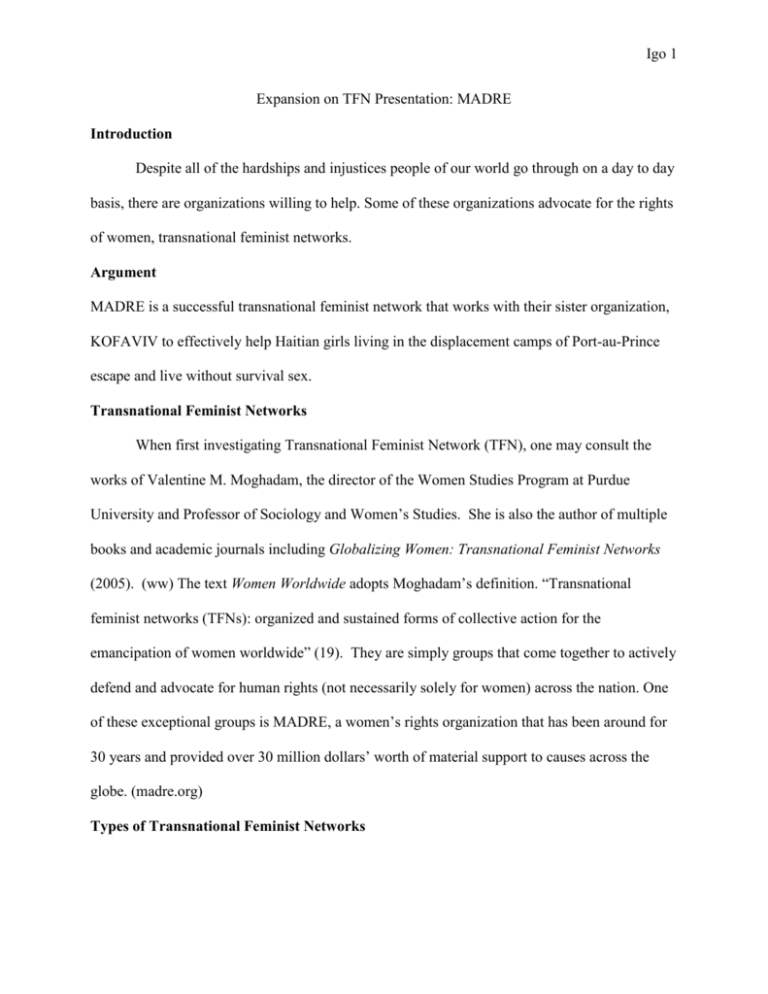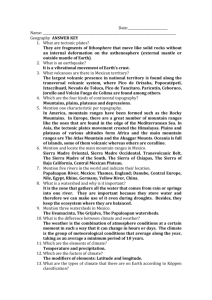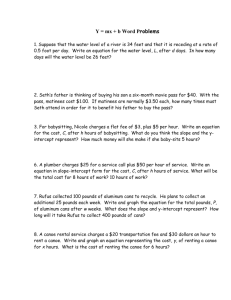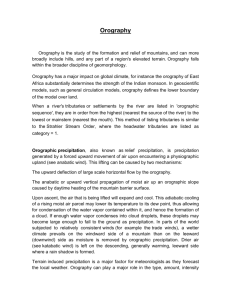
Igo 1
Expansion on TFN Presentation: MADRE
Introduction
Despite all of the hardships and injustices people of our world go through on a day to day
basis, there are organizations willing to help. Some of these organizations advocate for the rights
of women, transnational feminist networks.
Argument
MADRE is a successful transnational feminist network that works with their sister organization,
KOFAVIV to effectively help Haitian girls living in the displacement camps of Port-au-Prince
escape and live without survival sex.
Transnational Feminist Networks
When first investigating Transnational Feminist Network (TFN), one may consult the
works of Valentine M. Moghadam, the director of the Women Studies Program at Purdue
University and Professor of Sociology and Women’s Studies. She is also the author of multiple
books and academic journals including Globalizing Women: Transnational Feminist Networks
(2005). (ww) The text Women Worldwide adopts Moghadam’s definition. “Transnational
feminist networks (TFNs): organized and sustained forms of collective action for the
emancipation of women worldwide” (19). They are simply groups that come together to actively
defend and advocate for human rights (not necessarily solely for women) across the nation. One
of these exceptional groups is MADRE, a women’s rights organization that has been around for
30 years and provided over 30 million dollars’ worth of material support to causes across the
globe. (madre.org)
Types of Transnational Feminist Networks
Igo 2
There are four types of TFNs. These are feminism against neoliberalism, feminism
against fundamentalism, feminism against imperialism and war, and feminist humanitarianism.
MADRE falls under the category of the last two. Feminism against war and imperialism are
“women’s groups [. . .] involved in peace work in their focus on causes and consequences of
conflict, methods of conflict resolution and peace building, and conditions necessary for human
security” (Lee, 34). MADRE falls under this category because from the beginning of their
foundation, they have stood against war, advocating against it and supporting those harmed by it.
“Feminist humanitarianism consists of moral support and material assistance for those in conflict
zones or repressive states” (39). MADRE does a lot of work in this area too. They pair up with
sister organizations around the globe and support their causes. This is the method they use to
reach out to Haitian women suffering from sexual violence after the earth quake with their sister
organization KOFAVIV.
The History of MADRE:
MADRE was founded in the US 1983 by Kathy Engel when she organized a group a
women activists including poets, teachers, artists and health professionals to Nicaragua to
witness the harm done after the bombing during the US-sponsored Contra War. Day cares,
schools, and clinics were destroyed and no longer running. They were angered and horrified by
the way people were suffering and agreed to spread awareness. When they returned to the US,
they started to put together a women-led, women-run international human rights organization to
help impact the lives of those endangered by natural disasters and war. The worked to inform the
US of people living around the world in conditions like those they saw in Nicaragua. They
sought out sister organizations around the world who shared with them this common cause.
They supported them financially and worked hand in hand with them to build alternatives to war
Igo 3
and violence. (madre.org) “From the start, MADRE approached its work from the perspective of
women, reflecting the world through the eyes of those who are responsible for the housing,
health care, day care, nutrition, education and emotional wellbeing of the vast majority of the
population and who are targeted for discrimination and violence” (madre.org).
An Introduction to MADRE
MADRE’s slogan is “Demanding Rights, Resources and Results for Women
Worldwide.” This is exactly what MADRE does. In order to insure that their funds and support
are not put to waste, they get involved with and support existing women’s organizations—their
sister programs. These sister organizations are able to use their own perspectives to see what is
needed in their part of the globe. MADRE comes in and assists them with resources, leadership,
training and technical support. Currently, MADRE is involved in 30 projects Afghanistan,
Colombia, Guatemala, Haiti, Iraq, Kenya, Nicaragua, Palestine, Peru, and Sudan. The various
projects address women’s health, combating violence against women, peace building, and
Economic and environmental justice “We work towards a world in which all people enjoy the
fullest range of individual and collective human rights; in which resources are shared equitably
and sustainably; in which women participate effectively in all aspects of society; and in which
people have a meaningful say in decisions that affect their lives” (madre.org).
A Haven for Haitian Girls:
One of the projects MADRE is involved in is “A Haven for Haitian Girls.” Together
with their sister organization KOFAVIV they provide help for Haitian girls who are victims of
rape and survival sex—paying for food or other basic human needs with sexual favors.
(madre.org) The earthquake of January 2010 left a lot of girls orphaned and homeless. The
Haitian government placed them in displacement camps in Port-au-Prince. However, these
Igo 4
camps were very dangerous. The conditions are overcrowded, lacking in privacy including
private bathing areas, unsanitary, health hazardous, poor lighting, lack of tents and sleeping
areas, lack of police presence and they had little protection from violence. Due to the lack of
supervision and protection, these girls fell victim to survival sex, rape and sexual violence. “In
the first two months after the earthquake, KOFAVIV tracked 230 incidents of rape in just 15
camps in Port-au-Prince” (Bookey 4). One of the reasons this continues to happen is because of
the governmental response to the issue. Rape survivors have reported that police men are
unwilling to help them. “Many women stated that when they approached the police for help, the
police said that there was nothing they could do and the survivor should return when she had
identified and/or captured their attacker” (Bookey 4).
Shortly after the earthquake, KOFAVIV recognized what was going on and initiated an
outreach program to help young girls who were turning to survival sex. Thanks to support from
MADRE, KOFAVIV was able to organize a group of outreach workers called agents to seek out
young girls and women who were suffering from survival sex in the displacement camps and
offer them support and services. Some of these agents were survivors of rape or formally
engaged in survival sex, making them the perfect mentors. Besides offering safe sex materials,
food, and hygiene items, these agents also provide a one-on-one peer and crisis support system.
This strategy helped to establish a sense of community and increased the overall health and
safety of youth hurt by sexual exchange. KOFAVIV also has a youth program that offers selfesteem building workshops, art singing and dance classes, social rehabilitation services,
psychological counseling, treatment for post-traumatic stress disorder, and services that help
girls financially and psychologically return to school. (Davis 19) Through the services that
KOFAVIV provides girls are able to gain the skills needed to stop engaging in survival sex, gain
Igo 5
confidence, make and build friendships, find temporary shelter, medical assistance, and
psychosocial support to heal from emotional trauma and depression. (madre.com)
Conclusion: Analysis
MADRE is an affective transnational feminist organization. Professional opinion points
to this. The article “A Meridians Report on Madre: The War on Iraq” is a first had account of a
meeting to celebrate International Women’s Day. It was held on March 8th, 2003 by Amrita
Basu, director of the Women’s Research Center in South Hadley, MA. She invited MADRE to
present at this meeting. (Meridians) “Basu noted that MADRE is to be commended for not
confining itself to simply documenting infractions on human rights but to also working actively
to protest them; the organization is also to be commended for working not to privilege women's
and civil and political rights over their economic and social rights”(Meridians 133). As one can
see, MADRE is not only praised on their website but also held in high regards among
professionals.
With regards to MADRE and their project with KOFAVIV, there is both success and
room for improvement. Thanks to these organizations, girls were given the skills to stop engaign
in survival sex, their confidence was built up, they received temporary shelter and medical
assistance, and moral support. However, four years after the earthquake women are still living in
the camps in Port-au-Prince and threatened by sexual assault. Although projects take time,
clearly more needs to be done to completely heal Haiti. MADRE and KOFAVIV need more
funds and more volunteers. (madre.org)








